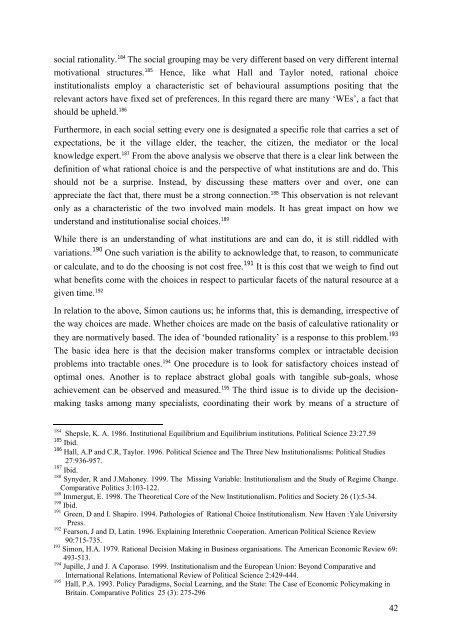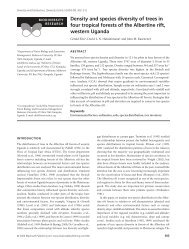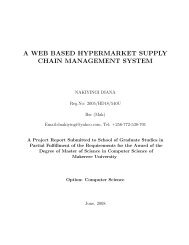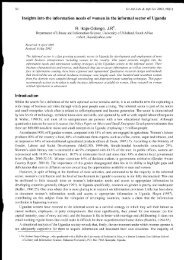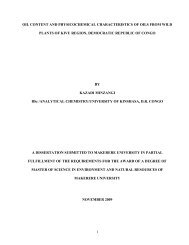THE UNIVERSITY OF LEIPZIG
THE UNIVERSITY OF LEIPZIG
THE UNIVERSITY OF LEIPZIG
Create successful ePaper yourself
Turn your PDF publications into a flip-book with our unique Google optimized e-Paper software.
social rationality. 184 The social grouping may be very different based on very different internal<br />
motivational structures. 185 Hence, like what Hall and Taylor noted, rational choice<br />
institutionalists employ a characteristic set of behavioural assumptions positing that the<br />
relevant actors have fixed set of preferences. In this regard there are many ‘WEs’, a fact that<br />
should be upheld. 186<br />
Furthermore, in each social setting every one is designated a specific role that carries a set of<br />
expectations, be it the village elder, the teacher, the citizen, the mediator or the local<br />
knowledge expert. 187 From the above analysis we observe that there is a clear link between the<br />
definition of what rational choice is and the perspective of what institutions are and do. This<br />
should not be a surprise. Instead, by discussing these matters over and over, one can<br />
appreciate the fact that, there must be a strong connection. 188 This observation is not relevant<br />
only as a characteristic of the two involved main models. It has great impact on how we<br />
understand and institutionalise social choices. 189<br />
While there is an understanding of what institutions are and can do, it is still riddled with<br />
variations. 190 One such variation is the ability to acknowledge that, to reason, to communicate<br />
or calculate, and to do the choosing is not cost free. 191 It is this cost that we weigh to find out<br />
what benefits come with the choices in respect to particular facets of the natural resource at a<br />
given time. 192<br />
In relation to the above, Simon cautions us; he informs that, this is demanding, irrespective of<br />
the way choices are made. Whether choices are made on the basis of calculative rationality or<br />
they are normatively based. The idea of ‘bounded rationality’ is a response to this problem. I93<br />
The basic idea here is that the decision maker transforms complex or intractable decision<br />
problems into tractable ones. 194 One procedure is to look for satisfactory choices instead of<br />
optimal ones. Another is to replace abstract global goals with tangible sub-goals, whose<br />
achievement can be observed and measured. 195 The third issue is to divide up the decisionmaking<br />
tasks among many specialists, coordinating their work by means of a structure of<br />
184 Shepsle, K. A. 1986. Institutional Equilibrium and Equilibrium institutions. Political Science 23:27.59<br />
185 Ibid.<br />
186 Hall, A.P and C.R, Taylor. 1996. Political Science and The Three New Institutionalisms: Political Studies<br />
27:936-957.<br />
187 Ibid.<br />
188 Synyder, R and J.Mahoney. 1999. The Missing Variable: Institutionalism and the Study of Regime Change.<br />
Comparative Politics 3:103-122.<br />
189 Immergut, E. 1998. The Theoretical Core of the New Institutionalism. Politics and Society 26 (1):5-34.<br />
190 Ibid.<br />
191 Green, D and I. Shapiro. 1994. Pathologies of Rational Choice Institutionalism. New Haven :Yale University<br />
Press.<br />
192 Fearson, J and D, Latin. 1996. Explaining Interethnic Cooperation. American Political Science Review<br />
90:715-735.<br />
I93 Simon, H.A. 1979. Rational Decision Making in Business organisations. The American Economic Review 69:<br />
493-513.<br />
194 Jupille, J and J. A Caporaso. 1999. Institutionalism and the European Union: Beyond Comparative and<br />
International Relations. International Review of Political Science 2:429-444.<br />
195 Hall, P.A. 1993. Policy Paradigms, Social Learning, and the State: The Case of Economic Policymaking in<br />
Britain. Comparative Politics 25 (3): 275-296<br />
42


